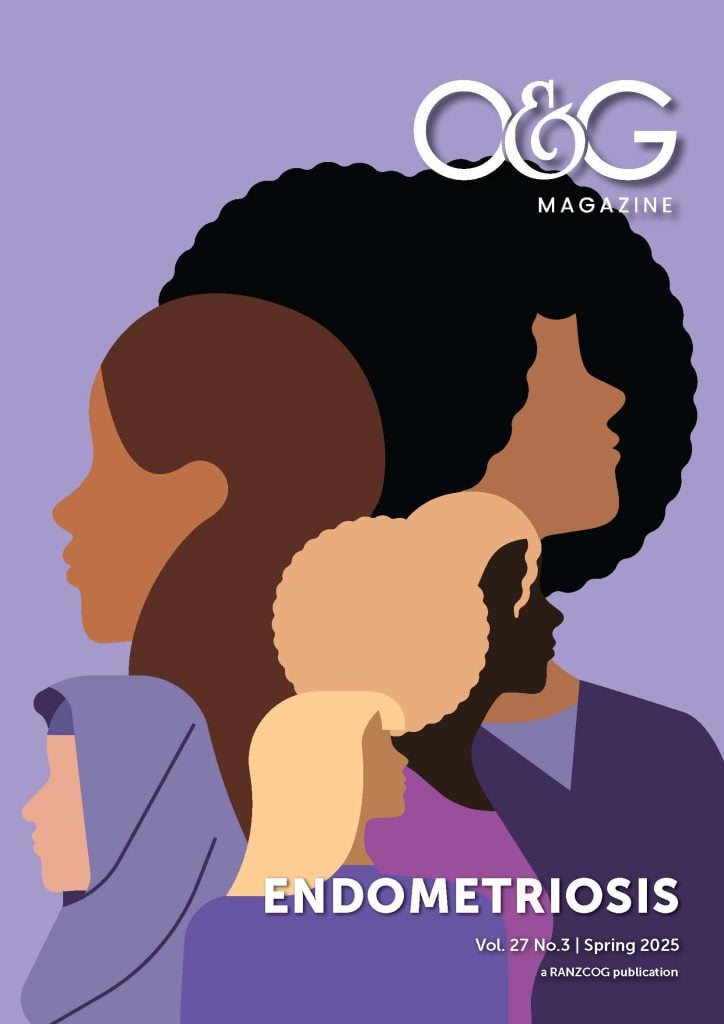Introduction
Endometriosis is incredibly common, affecting up to 14% of Australian women aged under 50 years.1 Characterised by a range of often chronic, unpredictable and often severe symptoms, the condition can have vast negative impacts on daily life and quality of life, affecting women’s finances, relationships, mental health and their ability to work, learn, socialise, exercise and have children.2,3
Gastrointestinal Symptoms in Endometriosis
Gastrointestinal symptoms are extremely common in endometriosis, affecting over 75% of sufferers.4-6 Bloating (81%), constipation (86%), diarrhoea (78%) and abdominal pain (80%)5 are frequently reported and often overlap with irritable bowel syndrome (IBS), which has a pooled prevalence of 23.4% in this population.7 This overlap amplifies the pain experience (due to lower pain thresholds and more severe menstrual cycles), and increases the risk of misdiagnosis, drives healthcare utilisation, and further diminishes quality of life.8,9
Despite the high prevalence and significant impact of gastrointestinal symptoms in endometriosis, treatment options remain vastly inadequate. Some pharmacological treatments (such as progesterone, opioids and non-steroidal anti-inflammatory medications) can make symptoms worse. Patient dissatisfaction with treatment options is common. Surgical excision is linked to long wait times and the likelihood of repeat procedures, whereas pharmacological approaches, including hormonal therapies and analgesics, are associated with high out-of-pocket costs and persistent pain.11,12 As a result, many turn to self-management approaches, such as diet therapies and nutritional supplements in an effort to manage symptoms and take charge of their illness.15
Evidence for Nutritional Interventions
Nutritional supplement use is widespread in women with endometriosis, with multiple studies indicating that the majority of sufferers take or have taken nutritional supplements in an attempt to manage their symptoms, despite relatively low rates of self-perceived efficacy.16-19 For instance, a recent international survey of 2,388 women with endometriosis revealed that >58% had used nutritional supplements, despite only 43% reporting an improvement in pain. In Australia, data collected from 303 women with endometriosis revealed frequent use of fish oil (75%), multivitamins (36%), vitamin B (29%) and vitamin D (28%).
Despite this, the quality of evidence supporting the practice of nutritional supplementation is poor. A recent scoping review that included six randomised controlled trials (RCTs) evaluating the effect of commonly used nutrition supplements (garlic; combined vitamins C and E; combined trace elements; omega-3; curcumin, and resveratrol) on endometriosis related pain revealed only the garlic, trace element and the combined vitamin C and E interventions showed any promise for improving pain. Omega-3, curcumin and resveratrol supplementation did not lead to improvements in endometriosis-related pain, and none of the studies reported improvements in quality of life or gastrointestinal symptoms. Notably, the authors cautioned about the poor quality of studies in this area, with several studies failing to follow intention-to-treat principles (which risks over-stating the findings), none having controlled for background dietary intake and a lack of reporting on adherence and adverse events.20
FODMAP Diet for Endometriosis – Research Update
A clear disconnect exists between patients’ expectations of nutritional interventions for endometriosis and the scientific evidence supporting their effectiveness. To address this, Monash University researchers recently published the first randomised controlled crossover feeding study in patients with endometriosis (EndoFOD).50 The EndoFOD study evaluated a 28-day low FODMAP diet in 35 women with endometriosis and poorly controlled gastrointestinal symptoms. Participants received either a supplied low FODMAP diet or a supplied control diet, both of which were modelled on Australian Dietary Guidelines and nutritionally matched, except for FODMAPs. Participants consumed the supplied diet for 28 days, before washing out for at least 28 days and crossing over to the alternate diet. To control for the known effect of the menstrual cycle on gastrointestinal symptoms, participants commenced each diet on day one of a menstrual cycle. By the end of the intervention, 60% of participants responded to the low FODMAP diet, and experienced clinically significant improvements in gastrointestinal symptom severity. Improvements were also seen for abdominal pain, bloating, stool form (fewer loose stools) and quality of life. When gastrointestinal symptoms were compared over the four weeks on each diet, improvements were apparent by week two of the low FODMAP diet, after which time improvements continued (albeit more gradually) until the end of the intervention. By contrast, symptom improvements on the control diet, diminished by week four.
Future Dietary Research
Results from the EndoFOD study are encouraging, so where to from here for dietary research in endometriosis? The FODMAP diet should be tested in a real-world, multi-centre trial that involves dietitians teaching the diet and patients with endometriosis modifying their diet based on this advice. While the Monash study robustly confirmed the efficacy of the FODMAP diet for endometriosis by supplying most food to participants for the four-week intervention, thus ensuring a high degree of control and good adherence, this does not reflect real-world conditions when patients face barriers to intervention adherence, such as motivation, understanding the prescribed intervention, food availability and convenience.51
There is also much interest in the role of ‘anti-inflammatory’ diets in endometriosis. While uncontrolled studies have reported improvements in endometriosis related pain on the Mediterranean diet49 (a diet high in anti-inflammatory components such as antioxidants, mono-and polyunsaturated fatty acids, dietary fibre and polyphenols), well-designed studies, in a similar vein to the EndoFOD study50, measuring the effect of this diet in endometriosis are much needed. The Mediterranean diet is of particular interest given high rates of mental health comorbidity in women with endometriosis22 and evidence that adherence to a Mediterranean diet reduces depressive symptoms in people with moderate to severe depression.52
Recommendations for Practice
What can clinicians recommend to patients wishing to explore dietary management options for their endometriosis?
- While there is insufficient evidence to recommend a specific nutritional supplement for endometriosis-related pain, if patients are wishing to try a nutrition supplement, they should be advised to take one supplement at a time, at the recommended dose, for a time-limited period (e.g. four weeks), and to monitor symptom response. If the desired symptom response is not achieved, the supplement should be discontinued. Before making recommendations regarding supplement use, consider the safe upper limit of intake, potential drug-nutrient interactions and cost.
- In patients with endometriosis and poorly controlled gastrointestinal symptoms (e.g. abdominal pain, gas, bloating and altered bowel habit), a FODMAP diet can be considered. This diet should be followed in three steps. In the first step, patients eat mostly low FODMAP foods for 2-6 weeks. In the second step they complete a series of food challenges to identify which FODMAPs trigger their gastrointestinal symptoms. In the third step they reintroduce well tolerated FODMAPs and only restrict a small number of FODMAPs that trigger their gastrointestinal symptoms. Long term, the idea is to follow a minimally restrictive diet that strikes a balance between good symptom control and adequate expansion of the diet. Given gastrointestinal symptoms frequently fluctuate over the course of the menstrual cycle, for patients who get a period, it might be that they only need to limit their FODMAP intake immediately before and during menstruation.
- Patients should be advised to avoid unnecessary restrictive diets (e.g. gluten free, dairy free) due to a lack of evidence for efficacy, and due to the risks associated with dietary restrictions such as food-related anxiety, difficulties socialising around food and disordered eating behaviours.
- Instead, patients should be counselled about following a healthy eating pattern consistent with Australian Dietary Guideline recommendations. Despite a lack of strong evidence for efficacy, a Mediterranean diet can be considered for endometriosis, given it is safe and non-restrictive with broad health and mental health benefits.
- Where possible, refer patients seeking dietary advice to an Accredited Practising Dietitian, and ideally, to a dietitian working in a multidisciplinary endometriosis care team.
References
- Nutrition Interventions in the Treatment of Endometriosis: A Scoping Review. J Hum Nutr Diet. 2025;38(1).
- Krabbenborg I, de Roos N, van der Grinten P, Nap A. Diet quality and perceived effects of dietary changes in Dutch endometriosis patients: an observational study. Reproductive BioMedicine Online. 2021;43(5):952-61.
- Koller D, Pathak GA, Wendt FR, Tylee DS, Levey DF, Overstreet C, et al. Epidemiologic and Genetic Associations of Endometriosis With Depression, Anxiety, and Eating Disorders. JAMA Network Open. 2023;6(1):e2251214-e.
- Armour M, Middleton A, Lim S, Sinclair J, Varjabedian D, Smith CA. Dietary Practices of Women with Endometriosis: A Cross-Sectional Survey. The Journal of Alternative and Complementary Medicine. 2021;27(9):771-7.
- Horne AW, Missmer SA. Pathophysiology, diagnosis, and management of endometriosis. Bmj. 2022;379:e070750.
- Nodler JL, Harris HR, Chavarro JE, Frazier AL, Missmer SA. Dairy consumption during adolescence and endometriosis risk. Am J Obstet Gynecol. 2020;222(3):257.e1-.e16.
- Harris HR, Eke AC, Chavarro JE, Missmer SA. Fruit and vegetable consumption and risk of endometriosis. Hum Reprod. 2018;33(4):715-27.
- Harris HR, Chavarro JE, Malspeis S, Willett WC, Missmer SA. Dairy-food, calcium, magnesium, and vitamin D intake and endometriosis: a prospective cohort study. Am J Epidemiol. 2013;177(5):420-30.
- Missmer SA, Chavarro JE, Malspeis S, Bertone-Johnson ER, Hornstein MD, Spiegelman D, et al. A prospective study of dietary fat consumption and endometriosis risk. Human Reproduction. 2010;25(6):1528-35.
- Yamamoto A, Harris HR, Vitonis AF, Chavarro JE, Missmer SA. A prospective cohort study of meat and fish consumption and endometriosis risk. Am J Obstet Gynecol. 2018;219(2):178.e1-.e10.
- Arab A, Karimi E, Vingrys K, Kelishadi MR, Mehrabani S, Askari G. Food groups and nutrients consumption and risk of endometriosis: a systematic review and meta-analysis of observational studies. Nutr J. 2022;21(1):58.
- Barnard ND, Holtz DN, Schmidt N, Kolipaka S, Hata E, Sutton M, et al. Nutrition in the prevention and treatment of endometriosis: A review. Front Nutr. 2023;10:1089891.
- Allaire C, Bedaiwy MA, Yong PJ. Diagnosis and management of endometriosis. Cmaj. 2023;195(10):E363-e71.
- Becker CM, Bokor A, Heikinheimo O, Horne A, Jansen F, Kiesel L, et al. ESHRE guideline: endometriosis†. Human Reproduction Open. 2022;2022(2):hoac009.
- National Institute for Health and Care Excellence (NICE). Endometriosis: diagnosis and management. 2017;25. https://www.nice.org.uk/guidance/ng73 Accessed 21 March 2024.
- Australian clinical practice guideline for the diagnosis and management of endometriosis (2021). RANZCOG, Melbourne, Australia.
- Royal Australian and New Zealand College of Obstetricians and Gynaecologists. (2025). Australian living evidence guideline: Endometriosis. https://ranzcog.edu.au/resources/endometriosis-clinical-practice-guideline/.
- Mardon AK, Leake HB, Hayles C, Henry ML, Neumann PB, Moseley GL, et al. The Efficacy of Self-Management Strategies for Females with Endometriosis: a Systematic Review. Reprod Sci. 2023;30(2):390-407.
- Sverrisdóttir UÁ, Hansen S, Rudnicki M. Impact of diet on pain perception in women with endometriosis: A systematic review. European Journal of Obstetrics & Gynecology and Reproductive Biology. 2022;271:245-9.
- Nirgianakis K, Egger K, Kalaitzopoulos DR, Lanz S, Bally L, Mueller MD. Effectiveness of Dietary Interventions in the Treatment of Endometriosis: a Systematic Review. Reprod Sci. 2022;29(1):26-42.
- Huijs E, Nap A. The effects of nutrients on symptoms in women with endometriosis: a systematic review. Reproductive BioMedicine Online. 2020;41(2):317-28.
- Sesti F, Pietropolli A, Capozzolo T, Broccoli P, Pierangeli S, Bollea MR, et al. Hormonal suppression treatment or dietary therapy versus placebo in the control of painful symptoms after conservative surgery for endometriosis stage III-IV. A randomized comparative trial. Fertil Steril. 2007;88(6):1541-7.
- Borghini R, Porpora MG, Casale R, Marino M, Palmieri E, Greco N, et al. Irritable bowel syndrome-like disorders in endometriosis: prevalence of nickel sensitivity and effects of a low-nickel diet. An open-label pilot study. Nutrients. 2020;12(2):341.
- Signorile PG, Viceconte R, Baldi A. Novel dietary supplement association reduces symptoms in endometriosis patients. J Cell Physiol. 2018;233(8):5920-5.
- Borghini R, Simoncelli M, Marino M, Casale R, Porpora MG, Picarelli A. P.10.15 Relationship between nickel allergic contact mucositis and nickel-rich diet in symptomatic women suffering from endometriosis. Digestive and Liver Disease. 2018;50:e234.
- Moore JS, Gibson PR, Perry RE, Burgell RE. Endometriosis in patients with irritable bowel syndrome: Specific symptomatic and demographic profile, and response to the low FODMAP diet. Aust N Z J Obstet Gynaecol. 2017;57(2):201-5.
- Caserta D, Matteucci E, Ralli E, Bordi G, Moscarini M. Celiac disease and endometriosis: an insidious and worrisome association hard to diagnose: a case report. Clin Exp Obstet Gynecol. 2014;41(3):346-8.
- Marziali M, Venza M, Lazzaro S, Lazzaro A, Micossi C, Stolfi VM. Gluten-free diet: a new strategy for management of painful endometriosis related symptoms? Minerva Chir. 2012;67(6):499-504.
- Chandrareddy A, Muneyyirci-Delale O, McFarlane SI, Murad OM. Adverse effects of phytoestrogens on reproductive health: a report of three cases. Complement Ther Clin Pract. 2008;14(2):132-5.
- Ott J, Nouri K, Hrebacka D, Gutschelhofer S, Huber J, Wenzl R. Endometriosis and nutrition-recommending a Mediterranean diet decreases endometriosis-associated pain: an experimental observational study. J Aging Res Clin Practice. 2012;1:162–6.
- Varney JE, So D, Gibson PR, Rhys-Jones D, Lee YSJ, Fisher J, et al. Clinical Trial: Effect of a 28-Day Low FODMAP Diet on Gastrointestinal Symptoms Associated With Endometriosis (EndoFOD)-A Randomised, Controlled Crossover Feeding Study. Aliment Pharmacol Ther. 2025;61(12):1889-903.
- Staudacher HM, Yao CK, Chey WD, Whelan K. Optimal Design of Clinical Trials of Dietary Interventions in Disorders of Gut-Brain Interaction. Am J Gastroenterol. 2022;117(6):973-84.
- Jacka FN, O’Neil A, Opie R, Itsiopoulos C, Cotton S, Mohebbi M, et al. A randomised controlled trial of dietary improvement for adults with major depression (the ‘SMILES’ trial). BMC Medicine. 2017;15(1):23.








Leave a Reply